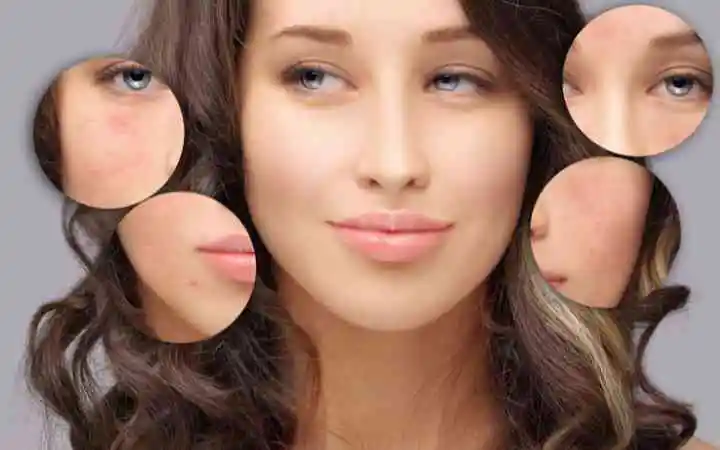Acne scars can be a natural source of psychological suffering and complexity for many people who have suffered from this skin condition. However, there are solutions to reduce or even eliminate these scars. Our general practitioners and dermatologists tell you everything about acne scars and share the different treatment options.
What is an acne scar?
Acne scars form when skin lesions, such as pimples and blackheads, heal and leave a mark on the skin. Before treating an acne scar, it is essential to know the type.
What are the different types of acne scars?
Acne scars can appear in different forms:
Hollow scars
These scars are characterized by depressions in the skin. They are usually caused by loss of skin tissue due to the destruction of collagen secondary to acne inflammation. Indentation scars can be small holes, craters, or cavities.
Raised scars
Unlike recessed scars, these scars are raised above the surrounding skin. They often result from the overproduction of collagen during the acne-healing process. Raised scars may appear as bumps or thickenings of the skin.
Brown stains
Although they’re not technically scars, dark spots are common after acne. They appear in areas more pigmented than the rest of the epidermis, where acne spots are present.
Red or purple scars
These scars are characterized by skin discoloration, generally red or purple. They may fade over time, but treating them as soon as they appear to promote healing is best.
How do acne scars appear?
Acne scars can be caused by various acne-related factors. Here are some of the possible causes:
- Severe inflammation: Inflammatory acne, characterized by red, swollen pimples, has a higher risk of leaving scars. Deep inflammation damages skin tissue.
- Improper handling: Squeezing or touching pimples can aggravate acne and lead to scarring. Self-extracting comedones (blackheads) can also cause them.
- Type of acne: Acne cysts are deep, inflamed lesions. The likelihood of causing scarring is higher in the case of cysts rather than lighter pimples.
- Genetic factor: Genetic predisposition can influence how the skin heals after an acne breakout. Some people are more prone to scarring than others.
- Delayed treatment: Delayed acne can worsen inflammation and the risk of scarring.
- Poor skin hygiene: A poor skincare routine can encourage the buildup of oil, dead skin cells, and bacteria, worsening acne and increasing the risk of scarring.
- Sun exposure: Excessive exposure to the sun without protection can accentuate acne scars by increasing skin pigmentation.
What to do about acne scars?
Several treatment options are available to fade acne scars.
- Patience: The healing process for acne scars can take time. Be patient and consistent in your skincare routine.
- Hydration: Well-hydrated skin improves the appearance of scars. Drink plenty of water and use a moisturizer suited to your skin type.
- Gentle exfoliation: exfoliating your skin helps remove dead cells and stimulate cell regeneration. However, avoid excessive exfoliation to avoid irritating the skin.
- Aloe vera: This plant is known for its soothing and healing properties. Applied regularly to scars, it can promote the healing of the skin.
- Microdermabrasion: This treatment exfoliates the top layer of skin to reduce acne scars. It is effective for mild to moderate scarring.
- Chemical peel: This type of treatment uses acids to remove the upper layers of the epidermis. They are effective in fading acne scars and incredibly pigmented spots.
- Microneedling: This treatment involves using a medical device that creates tiny punctures in the skin, stimulating collagen production to improve skin texture.
- Laser therapy: Lasers (in non-ablative fractional mode) can help fade acne scars by stimulating cell regeneration and smoothing the skin.
- Corticosteroid injections: Raised acne scars, called hypertrophic scars, can be treated with corticosteroid injections to reduce inflammation.
- Hyaluronic acid: Fillers (injectable fillers) based on hyaluronic acid can fill in hollow scars, thus improving their appearance.
- Surgery: For profound and extensive acne scars, surgery, such as scar excision, may be necessary.
- Skin grafts: For deep scars, skin grafts can be performed to replace the scarred skin with healthy skin.
How to prevent acne scars?
- Early treatment of acne: It is essential to treat acne as soon as it appears. Consult a dermatologist for products and medications suitable for your skin type.
- Avoid handling pimples: Skin injuries, such as abrasions or scratching, can also cause scarring.
- Avoid sun exposure: UV rays can increase the pigmentation of acne scars. Always use SPF 50 sun protection.
- Hydration: Keep your skin well hydrated by using a non-comedogenic moisturizer.
- Use gentle products: Avoid products that are harsh on the skin, such as overly abrasive cleansers. Opt for gentle products suited to your skin type, and do not hesitate to ask your doctor or pharmacist for advice.
- Avoid comedogenic products: Use non-comedogenic skin care products, makeup, and creams to avoid clogged pores.
- Gentle exfoliation methods: If you use exfoliants, use gentle methods, such as chemical exfoliation, rather than abrasive scrubs.
- A balanced diet rich in vitamins, minerals, and antioxidants can promote skin healing. Fruits, vegetables, and nuts are particularly beneficial.
- Medical consultation: if you develop severe or cystic acne, consult a dermatologist for appropriate treatment.


